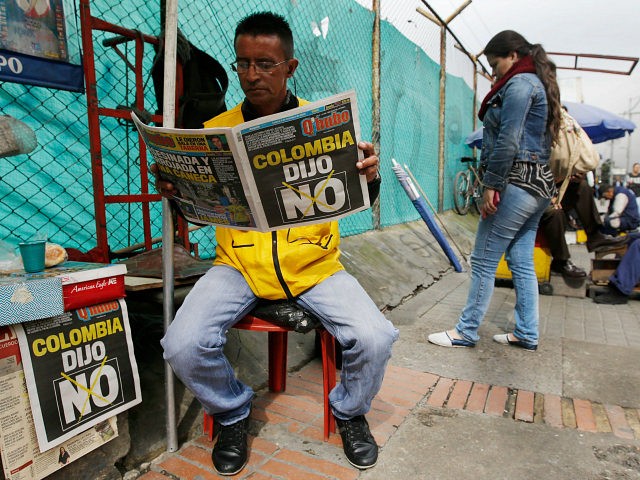The Colombian government and leaders of the FARC terrorist organization have returned to negotiations following the narrow defeat of a brokered peace deal that would have allowed most FARC terrorists to return to civilian life without serving prison time and would have seen the group evolve into a Marxist political party.
President Juan Manuel Santos and the leader of the Revolutionary Armed Forces of Colombia (FARC), “Timochenko,” signed a peace agreement last week that would have allowed all FARC terrorists to return to civilian life if they handed over their weapons — and all those found guilty of only “political crimes” to escape prison time. The agreement would be viable only if the Colombian people, through a national vote, approved it. By a margin of less than one percent, Colombians voted “no” to the agreement.
In addition to impunity for “political crimes,” an undefined category, save for it being one of two potential verdicts in a special FARC court — the other being “crimes against humanity” — the FARC would have been allowed to launch candidates for political office and would have been given representation without being elected to the nation’s Congress. Election representation may have come in 2018, when FARC leaders said they would hope to launch their first round of candidates. The deal did not specify how the FARC would fund political campaigns; its extensive drug trafficking network has turned it into the wealthiest non-jihadi terrorist organization in the world.
Now, the FARC and the Santos government are back to the negotiating table. Chief negotiator Humberto de la Calle, who offered to resign earlier this week, is in Havana, where Timochenko and the other FARC chiefs live thanks to the community Cuban government’s policy of providing safe haven to internationally wanted terrorists. The government hopes to agree to a deal that punishes FARC terrorists more aggressively in order to make the people more comfortable with it.
Timochenko appears to have dismissed the consequences of the vote, however, and it is unclear how that may affect negotiations. “Peace is a right regardless of majority, because it is a foundational right essential to human dignity,” he argued this week. “The Constitutional Court accepts this and accepted in a recent ruling that the plebiscite does not have any legal effect, only a political one,” he argued. The signature he provided, he argued, does have “an undeniable and irrevocable legal effect.”
The Court issued a ruling that barred President Santos from effecting the agreement should the “no” vote win, but it did note that its own ruling was not binding on Congress, whose members could draft the agreement as a bill. There is no evidence that the Colombian Congress — where ex-president and former Senator Álvaro Uribe wields great power — will move to enact the agreement.
Uribe, under whose tenure the FARC suffered the devastating losses that forced its leaders to retreat to Cuba, has been instrumental in pushing for the “no” vote. Following the vote, he told CNN he was “relieved” because, “for my country a ‘yes’ vote would have been more difficult.” He emphasized that those who support “no” do not want war: “We all want there to be no violence.”
The greatest evidence for this is that the vote was distributed nationally. The nation’s dense forest interior — the traditional FARC stomping grounds — voted in droves against the peace deal. The Colombian newspaper El Tiempo notes that among those towns overwhelming supporting the “no” vote were Planadas, the village known as the cradle of the FARC, and La Tebaida, Timochenko’s hometown. “Wouldn’t that be nice, handing the country over to the guerrillas?” an unidentified man snarked to an El Tiempo reporter in the latter location, where locals recall Timochenko as an avid reader and aggressive communist as a teen.
A man in Planadas explained his vote: “The guerrilla killed my wife and son, and I have seen too many atrocities and injustices to forget those horrible days.”
Others suggested that the “no” vote was not just a product of the policies up for election, but of the way Santos sold the deal: as a showpiece to display to the UN General Assembly, an excuse to throw a lavish party in the port city of Cartagena, far from where most FARC victims live. “If he had had the grace to step back and let the victims speak, it would have been completely different,” a Colombian commentator told The Guardian. “He would have held the moral high ground and people could have voted for peace without feeling they were being invited to support Santos.”

COMMENTS
Please let us know if you're having issues with commenting.